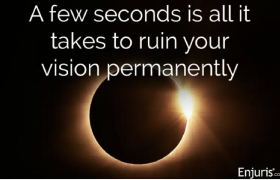It’s coming. April 8, 2024.
North America will experience a total solar eclipse that passes certain parts of Mexico, the U.S. and Canada. The moon will pass between the Sun and the Earth, blocking the Sun, and the sky will grow dark, appearing to be nighttime in the middle of the day.
About 44 million people live in the “path of totality,” or the area where the eclipse will be viewable—but indications are that between 1.85 million and 7.4 million people will travel on that day to get a glimpse.
This is a Big. Deal. to a lot of people because this particular solar eclipse, happening in the same place, occurs about once every 375 years. So even “once in a lifetime” doesn’t do it justice.
Why are schools closing for the event? Wouldn’t they want to have kids outside to make this a teachable, memorable moment? Allegedly, when the moon passes in totality over the sun, the image will be dark with a bright ring around it, like a glowing orb. And, from what scientists tell us, it will be quite beautiful and unforgettable.
To be clear, some schools are closing for the day because of the influx of travelers coming to large cities and small towns alike in the path of totality. Some communities are concerned about traffic and other issues with a sudden population boom for a day and they don’t want to have to worry about children getting home safely. For those, it’s a purely logistical consideration.
But some schools are closing even outside the path of totality, where the moon might darken the Sun’s rays for about three minutes and then the whole event is done. Those places are unlikely to have astronomy-loving travelers or stores sold out of bottled water and toilet paper for the event.
The reason is that some are concerned about liability for the potential injuries that could happen to a student who looks directly at the Sun.
What are the vision risks for a solar eclipse?
If you’re in the path of totality, you have up to four minutes and 28 seconds when it is safe to look directly at the Sun because the Moon obscures it. However, if you’re viewing the eclipse any other time (or ever looking at the Sun), you need protective glasses to safeguard your vision.
The Sun might not seem bright enough to cause near-instant vision damage, but it is.
It’s dangerous to look directly at the sun without specific glasses intended for this purpose. Regular sunglasses are not safe enough for eclipse viewing or looking directly at the Sun.
It’s also dangerous to view the Sun through a camera lens, binoculars or a telescope unless you have a special solar filter. Doing so can cause instant eye injury.
Learn more
https://www.enjuris.com/blog/news/safety-while-viewing-solar-eclipse/




